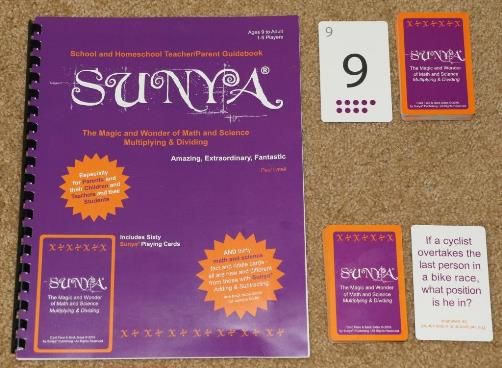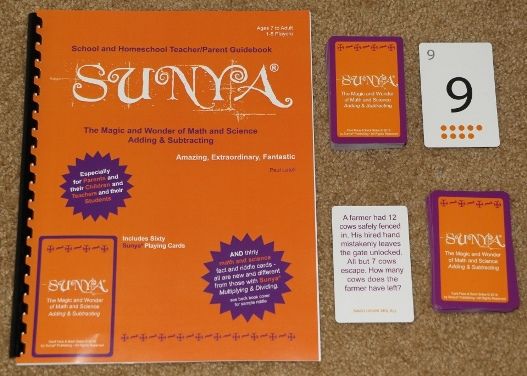Do you have children who enjoy games and could use some extra math practice as well? I do, and that's why I elected to review a new game called Sunya - The Magic and Wonder of Math and Science Multiplying & Dividing, which is put out by a new company called Sunya Publishing.
Because the company is new, the game of Sunya is in development, and the company website is not that developed yet, I was not exactly sure what to expect when I opened our "sneak peek" review package. What we received was:
- a 25-page Homeschool Teacher/Parent Guidebook, which includes color and gray-scale pages (the former of which I found easier on my eyes and encourage the publisher to use in its final version of the game)
- 60 playing cards (numbers, a multiplication symbol, a division symbol, an equals sign, and some wild cards)
- 30 fact/riddle cards
- a multiplication/division number line
So, of course, the first thing I did was open up the comb-bound, softcover teacher guide to learn how to play the game.
Yikes!
The guide was not the most user-friendly game instruction guide I've ever seen. In fact, it made the game seem downright confusing and, immediately, I wished there were either simpler instructions or a web address for finding video clips of how to play the game. For, honestly, 11 pages of instructions seemed daunting to me and, I kept thinking, at the very least, instead of all the text, the lengthy instructions could have included more diagrams that showed actual cards on them, such as were depicted on page seven of the guidebook (which I bet may just happen in final versions of this soon-to-be-on-the-market game!)
However, soon enough, I realized that I did not need all 11 pages to get a game up and running. In fact, the basic instructions were not that complicated once I looked them over a few times and I was able to begin play with my children fairly easily.
Playing Sunya

To play, I laid out a number sentence, dealt out four cards per player, and challenged my son to lay down some of his cards atop the ones in the number sentence to make a new, correct number sentence. Then, I did the same. If we could not make a number sentence, we drew more cards from a pile, and, when one of us was out of cards, we called, "Sunya" (pronounced soon-ya) and won the game.
At that point, the winner drew a card from the Riddle and Fact deck to read aloud.
Not too hard at all. In fact, the Basic Game was satisfyingly simple to catch onto once my children and I gave it a go, and quite fun with just enough challenge for at least one of my children.
The Children's Takes on the Game
Math may be universal, but opinions never are, right? That is a fact that my children prove. The two children of mine who played Sunya with me each had a different take on it.
My oldest, ten, liked Sunya"okay", but only played the game when I required him to as a part of lessons, since the game just did not capture him. When I asked him for his honest opinion about Sunya, he said:
I think it's a little bit boring. I do not really like math games and stuff as much as other things, so I just don't like Sunya much... It was okay, but not the best... It is a better way of practicing multiplication than some other ways, but not my favorite. I liked the Riddle and Fact cards better than the game.
My daughter, who is actually weaker with her multiplication facts than her big brother had a different - and more positive- opinion of Sunya. Whenever she saw her brother and I playing Sunya, she watched and asked if she could play. Then, she delighted in the game.
When I asked my daughter for her candid opinion about the game, she said:
I like saying "Soon-YAAAAA!" It is fun and it is a good game. It is easy, but not too easy. It's a certain amount of hard, which makes it FUN! I want to play it more.
So, that's exactly what we did. After my daughter gave her opinion about Sunya, we played it again.
We will continue to do so regularly as long as the game interests her, because, to me, any game that gets my daughter smiling over math and encourages us to spend 1:1 time together is a worthwhile way to spend our time!
Perhaps, my daughter and I will even get to the point where we can get beyond the Basic Game and utilize some of the other variations of play that are included in the guidebook, which include a division game, a team game, and a solitaire game.
Extra Information
Besides lengthy game instructions for different versions of Sunya play, the teacher's guide includes:
- a description of the meaning of the game's name (Sunya), which also described the origin of our modern number system, discussed math as a universal language, touched on cultural diversity, and got into how math knows no races, or geographic boundaries.
- a glossary of terms used for division and multiplication problems, which was simple and might prove helpful for those who cannot recall, say, what a mutliplicand and a multiplier are.
- an explanation of the parts of a number sentence, which could be helpful to some.
- a page of math quotes from Euripides to Einstein, which could be used for copywork or just for trivia or conversation.
- 5 pages of Math and Science Facts and Riddles which are redundant to the cards that came with the game.
- a page with some extra math facts and riddles
Since I know the final version of the game and its manual are not being sold quite yet, I will say that I do not think all of these extras add that much value to the game package and could easily be included on the company's website with a simple link to them included in briefer, less complicated guidebook that could make the game appear more "open and play" for customers. In fact, perhaps money saved in production by transferring the extras above to a website page could go towards including images of cards on full-color instruction pages which would make actual game play easier to understand.
Likewise, in a later version of the game, I think it would be helpful to have different backs for the cards that are Playing Cards and those that are Fact and Riddle Cards. (Sometimes, we found ourselves accidentally drawing from the wrong pile or shuffling them together.) Likewise, I would like to see more riddles, math challenges, or story problems among the Fact and Riddle Cards, which, in my opinion, are not necessary for the game, but do add another layer of fun and learning, which my son appreciated.
Final Thoughts
I give credit to Paul Latell, inventor of Sunya, for his efforts in creating this game and getting it so close to being ready for market! While I obviously think Sunya's presentation could benefit from a few tweaks, overall, I find the actual game interesting and worthwhile.
Sure, Sunya may not be a huge hit with my son, but I appreciate how, when I request that my son play it with me, I witness him practicing his math facts and stretching his thinking. Better still, my daughter, thoroughly enjoys the Basic Version of Sunya and asks me to play with with her. That makes the game a win, tweaks to it requested or not.
If you have children that need practice with multiplication and division and enjoy playing math-based card games, Sunya could could be for you. Watch for the version of it that will be on the market soon.
Also, watch for its companion game, an addition and subtraction version, which will be available soon as well.

I imagine it is not easy to get a game from concept to pilot testing to market these days, and it is clear that game inventor Paul Patell has done due diligence so far with this process, playing and testing the game with an elementary school classroom (which is mentioned in the Teacher/Parent Guidebook) and generously offering a pilot version of either Sunya - The Magic and Wonder of Math and Science Adding & Subtracting or Sunya - The Magic and Wonder of Math and Science Multiplying & Dividing to 100 Schoolhouse Review Crew familes. In doing so, I believe Me. Latell has proven that Sunya is educational for many (my son included) and enjoyable, too (for my daughter and I, for example). I encourage you to keep an eye our for versions of Sunya coming to market soon as well as to see what other families who have played pilot versions think about the game.
















No comments:
Post a Comment
Thank you so much for taking time to comment. We LOVE comments, read every one and appreciate all your thoughts, tips, questions and ideas.